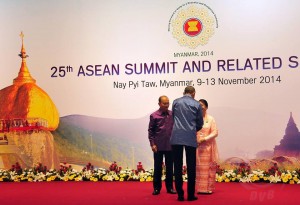Experienced journalist and expert on Burma, Bertil Listner, recently stated in a seminar that “there are many differences in [today’s] Burma, but [there has been no real] change”. He is absolutely right.
After winning the 2010 elections, Burma’s President U Thein Sein and his government have pretended to democratically reform Burma (Myanmar), promising a ‘clean government’, which engages in ‘good governance’.

Just recently, Burma’s Information Minister U Ye Htut stated that “the amendment of [the] 2008 Constitution is just internal affairs of Burma (Myanmar)”, and it seems that President U Thein Sein does not want world leaders, especially President Obama, to speak out about the obstacles to democracy presented in the 2008 Constitution; namely the veto-power afforded the Commander-in-Chief, currently Gen. Min. Aung. Hlaing.
Based on nearly four years of observation, President U Thein Sein’s government has not been sufficiently ‘cleaned’, as many corrupt conservative ministers continue to hold political positions, working to reverse the reform process, while some reform-minded ministers, like former Minister U Aung Kyi, have been forced to walk from the conservative cabinet. Currently, President U Thein Sein is surrounded by corrupt ministers and remains strongly influenced by cronies associated with the previous military regime.
‘Good governance’ remains a dream for the people of Burma. Every day that they wake up, since the induction of the democratic government in 2010, they do not see any progress. Government officials in all levels of the government are still soliciting bribes; hospitals do not provide reliable healthcare for its patients; school children must rely on outside tuition to pass exams, paying massive fees; and local governments and local contractors continue to work together to steal public monies. When the people are asked, they say that there has been no change, except for the improved ease of traveling, as there are now fewer checkpoints, and the increased access to news due to expanded media freedoms. The people of Burma continue to live under a repressive social and economic structure, similar to that found twenty years ago under the military regime.
As President U Thein Sein cannot order the Commander-in-Chief to cease all fighting against ethnic armed groups in Shan, Karen, and Mon States, it is clear that the Burmese Army is not under the command of the civilian-elected government, a crisis which has been created by the 2008 Constitution. It is quite sure that peace cannot be built in Burma if the Burmese Army continues to have ‘veto power’ over the government and citizens of Burma (Myanmar).
A recent report released by Harvard University also points to massive human rights violations committed by the Burmese Army, including the murder of journalist Ko Par Gyi, in Mon State. The soldiers remain under direct commands of the Commander-in-Chief, do not see a difference in today’s Burma, and continue to believe that they can act with impunity, as they did under the military regime.
US President Obama, and leaders around the world, should not praise the U Thein Sein government for its governance since 2010, as there has been no change. International leaders must apply increased pressure for amendment of the 2008 Constitution, in order for the country to truly transition to a democratic society, which is the hope and expectation of all the people of Burma.
